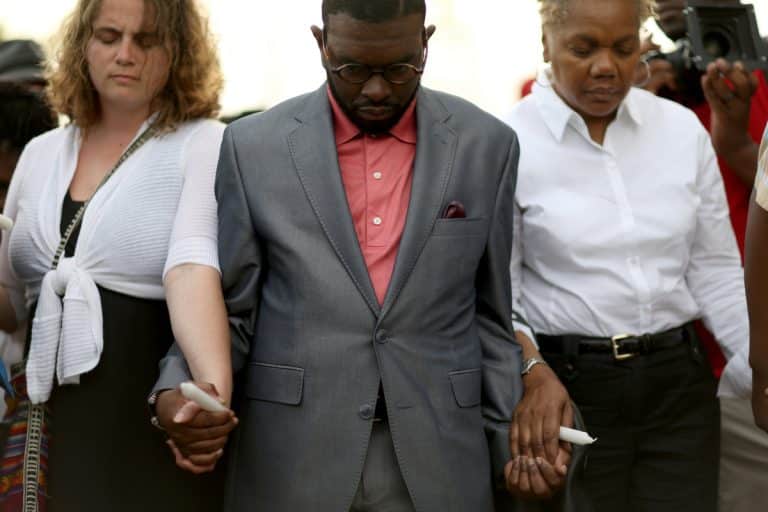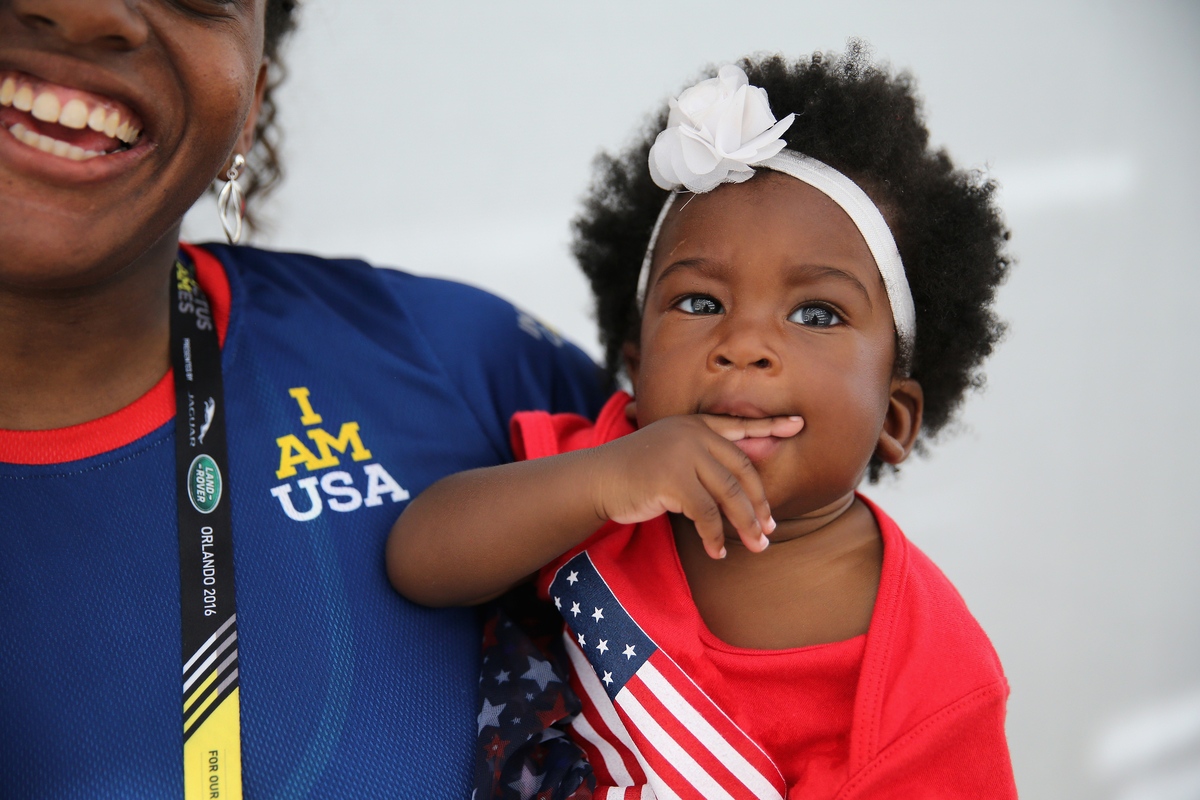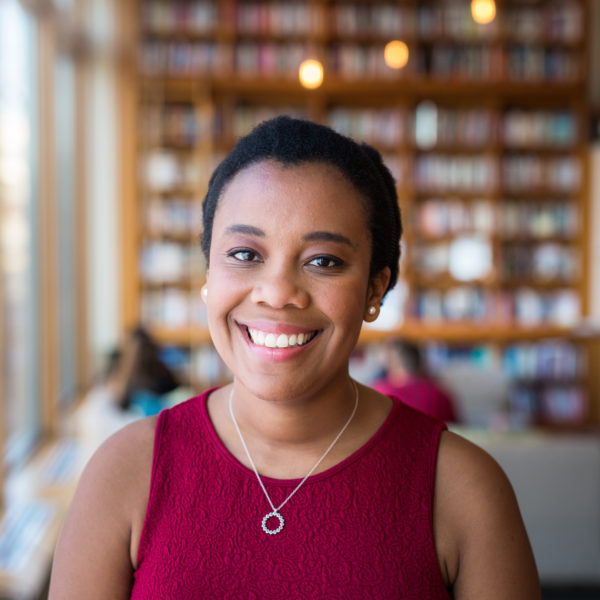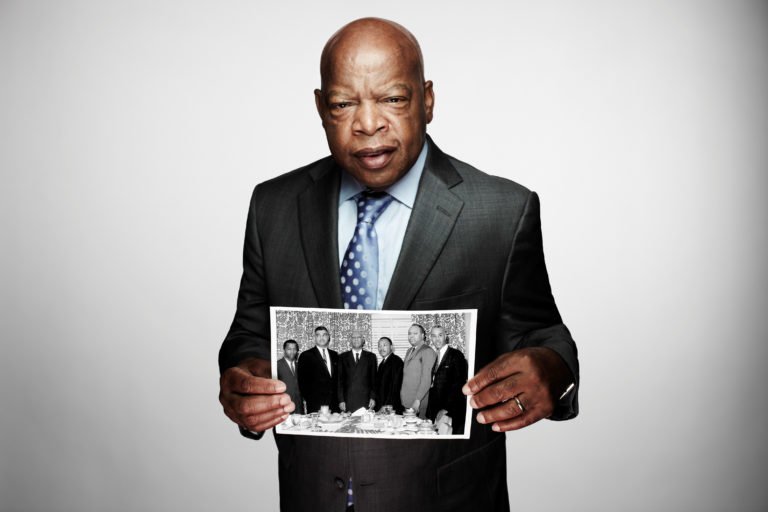
Image by Joe Raedle/Getty Images, © All Rights Reserved.
I Am the Breathing Legacy of One of America’s Great Original Sins
On November 8th, I collapsed in a fit of tears on the kitchen floor of our home. It was around 7 pm Central and polls had just closed in most states east of the Mississippi River. The results of the presidential election would not be announced for hours to come, but I could not escape the feeling of dread sitting heavy in the pit of my stomach. Even my husband, whose gentle demeanor and soothing spirit is my shelter during tough times, could not lift me from my state of mourning.
Our wedding, only a little over a week before my collapse, was a balm of hope in an otherwise desolate political landscape. The election cycle was painful for both of us. We are the children of communities who know the danger of being branded “other.”
The journey of my husband’s family, like many American Jews, is a story of violent exile from the shtetls of Eastern Europe to the shores of the Eastern seaboard of the United States. It is a story of death and determination, pain and perseverance, sorrow and survival. We watched with fear and apprehension as an undercurrent of anti-Jewishness broke through the surface of this election cycle. Jewish reporters were stalked online with images of gas chambers and, today, members of the white nationalist “alt-right” movement celebrate the election results with cries of “Heil Trump.”
I am a black woman ordained in the African Methodist Episcopal Church. I am the breathing legacy of one of America’s great original sins, the child of people stolen from the West African coasts to labor in the fields of Florida, Georgia, and Arkansas. I folded into myself: my arms wrapped tightly around my knees and found their rest on my heaving chest. Yet, as I opened my mouth to cry out to God, as I often do in moments of hopelessness, no sound emerged. My eyelids began to puff and tears stung as they fell down my cheek praying the prayers whose words alluded me. Rocking back and forth on the cool linoleum floor, I finally uttered the only words that I could find, “I don’t feel safe. I don’t feel safe.”
Like a gust of wind, I could suddenly feel the soulful presence of my ancestors surround me, holding me and bearing witness to my pain. Then I heard my mama’s spirit whisper gently, gently in my ear, “Baby, we ain’t never been safe.”
It was a sobering reminder that, for folks with brown skin like mine, the notion of “safety” is a privilege always just beyond our grasp. For many people of color in this nation, the miracle is that we survived. This is the testimony of my people that runs through my veins.
Etched into my DNA are stories of resilience. Ask my great grandmother Martha Ann. Family legend has it that, when she was pregnant with my great-aunt, she fled their Arkansas home hidden in a wagon under the cover of night. You see, my great grandfather William had the nerve to register other black folk vote in his community and death threats from the local Klansmen followed. It is in their memory that I participate in the democratic process. I know that my right to enfranchisement was bought with a blood price.
We are living in apocalyptic times. The apocalypse I have in mind is not the summer blockbuster image of the end of days brought about an alien, viral, or nuclear attack. Rather, we are in a period of remaking the world as we know it. My friend Heather recently reminded me that Greek root of the words “apocalypse” means to uncover.
Regardless of where you fall on the ideological spectrum or how you cast your vote, one thing is exceeding clear: the 2016 presidential cycle uncovered and left exposed a rupture at the very heart of our democracy. It is a rupture rooted in the deep paralysis of anxiety and disparate visions for our collective future. The very systems that once provided meaning are dying around us. Good factory jobs with union wages are gone. Membership in many religious communities is dwindling. Like any festering wound, the past eight years have exposed just how fragile and frayed the ties that bind our republic together really are.
Yet as hopeless as these times seem, the Christian tradition teaches me that out of death there is the possibility of new life.

As we prepare for the administration of President-elect Trump, the question at the forefront of my mind is the same one Dr. Martin Luther King, Jr. asked so many years ago:
“Where do we go from here? Chaos or Community?”
I choose community. The community I long for will not be found in shallow platitudes promoting reconciliation. It will require the courage of everyday heroes to dig deep and find within themselves the wherewithal to lean into one another and repair the breech of relationships this election has exposed.
I believe this will look different from community to community. I was not the only person to have a kitchen floor moment on election night. For those who have experienced the worst of this election cycle’s bigotry, hatred, and violence, this is a moment of “calling in.” Many of us whose identities place us at the margins are rightly fearing for our lives. In the absence of safe spaces, we need to create brave spaces of collective healing and fortification that will thicken our relationships to each other and ensure that we can withstand the difficult days ahead.
For others, the call is to create bridges across lines of difference. This bridge work is not an invitation into a type of kumbaya vision of unity through sameness. Instead, it invites us to lean in to our radical differences by inviting strangers to lean into vulnerability and share the truth of their life experiences — their hurts, challenges, joys, and concerns — to uncover the humanity in each of us. It will also require loving accountability to call out patterns of behavior that can be harmful and destructive to the livelihoods of others.
There is a temptation in these bridging spaces, particularly among my white liberal friends, to only want to bridge with those whose difference is clearly discernable to the human eye. To them, I say for the sake of your beloved human siblings, particularly those people of color who do not yet have the emotional space to be your teachers: please take this moment as an opportunity to also bridge with those whose diversity is not quite as visibly acute. For those in urban areas, that means bridging with rural communities. For those who carry educational privilege, it means listening to those without a college degree and acknowledging the knowledge gleaned from their experiences as valid and true. For those with family members of a different political party, practicing deep listening skills that give space for their viewpoints and concerns into account.
The movement between building bridges and brave spaces is not static but fluid. Some of us will move between both worlds. Some will invest in one. None of us can do it all, which is why we need each other. Let us call one another into a space of moral courage and hold each other well. What ills our nation will not be solved by electoral politics; it can only be solved by strengthening our relationships to one another. The ancestors are watching and waiting for our response.


Share your reflection